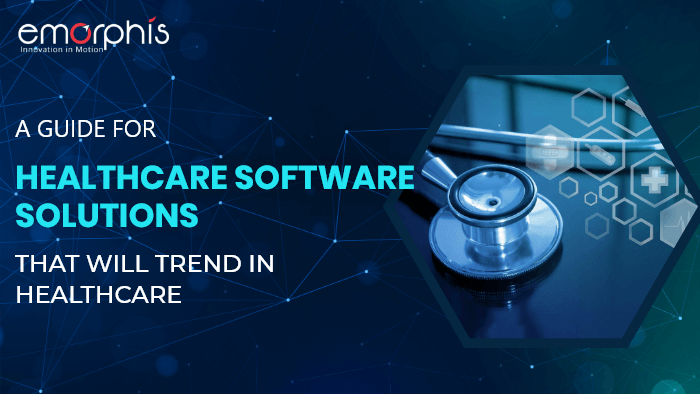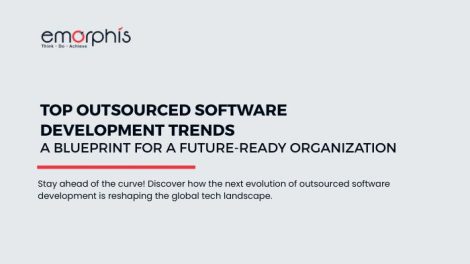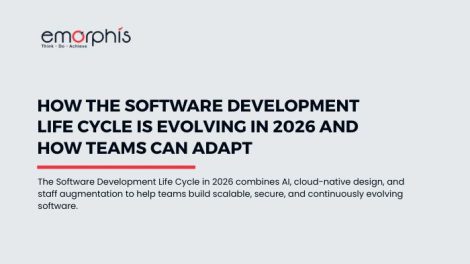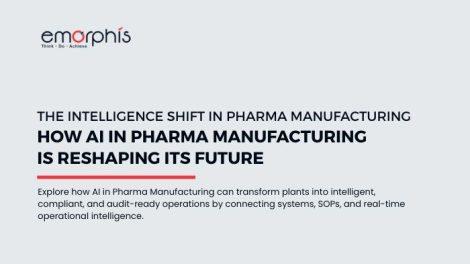Introduction
In recent times, healthcare software solutions such as EMR, RPM, home care services, clinical software, pharmacy apps, telemedicine solutions, etc. have become an integral part of healthcare organizations across the globe. With their help, healthcare providers can now manage and monitor patient data with great ease.
Such is the power of medical software that experts are optimistic about its growth which will reach about USD 32 billion by 2024 in just six years. Even healthcare software markets will double their value by USD 8.2 billion by 2023.
The given facts clearly show that the healthcare sector has fully embraced healthcare IT solutions to access the market opportunity waiting at their door and explore more aspects in the coming future.
In the given post, we will discover numerous benefits of healthcare software, its tremendous expansion, types, and even how much it costs. Let’s venture more into it.
What is Healthcare Software Solutions?
The FDA defines healthcare software solutions that are developed exclusively for the healthcare industry. They focus on bringing significant improvement in the patient experience by
- Streamlining communication between patients and health professionals.
- Digitalizing records of patient data, appointments, drug orders, and delivery.
- Inclusion of CRM and logistics to improve hospital management processes.
Benefits of Healthcare Software Solutions
Several benefits come with healthcare management software solutions and have inspired several medical institutions to avail themselves of their advantages:
I. Maintaining an Efficient Cooperation with Teams
Whether we are in another city or any remote area, getting better medical facilities is not impossible now. Healthcare solutions help clinics present in different areas to connect and offer medical aid to the needy online. Furthermore, it also assists in the creation of a global professional community where the sharing of knowledge is free with no hindrance in communicating in case of a medical emergency.
II. Personalized Healthcare Software Solutions
It is the 21st century, and people expect enterprises (even medical service providers) to offer personalized services. They want knowledge about health and doctors’ input simultaneously. Therefore, health apps, telemedicine, and even home testing kits are becoming more popular among the crowd. What’s more, an online booking system is a win-win system for both medical staff and patients.
III. Simplifying Medical Operations
Every medical device needs regular maintenance and timely repair to enhance its longevity. The arrival of healthcare software has streamlined the given in-house processes and diverted the attention of the medical staff from management issues and monitoring towards devising strategies for offering better medical care to patients.
IV. Offering a High Level of Security
The best medical software apps come with high-security features that help preserve the confidentiality of the sensitive data of the patients. Two notable examples are; HIPAA and NHS which are regulatory systems currently in function in the USA. They compel a medical app service provider to comply with its rules and fulfill all necessary certifications before entering the market.
V. Greater Satisfaction Rate among Patients
Now all the medical app facilities work with automation and doctors can access patient records instantaneously and offer them timely medical care in the most effective way. In this manner, patients are satisfied with the services provided to them and make them heal in time.
What are the Types of Healthcare Software Solutions?
Several exciting healthcare software solutions perform notable functions from record-keeping and monitoring to diagnostics through the use of high-tech services. Today, they are evolving at a rapid pace, with their demand increasing with each passing day. Electronic Health Records, Medical diagnosis, imaging, database, and research software, telemedicine solutions, e-prescribing software solutions, and appointment scheduling solutions are a few of the popular healthcare software solutions in recent times.
These are some of the commonly utilized healthcare applications that offer a seamless experience to medical experts as well as, patients.
Let’s analyze each type in detail:
A. Medical Practice Management Software (MPMS)
It has become an integral part of healthcare software that deals with everyday medical operations to make clinical workflows function seamlessly. How is it helpful? It is beneficial, especially for medical providers, as tracking information about the patient related to diagnosis, procedures, payment, insurance, etc., has become available just with a single click.
Examples: Prime Suite and eClinicalWorks
Why are they so crucial in the medical field?
- It permits staff to store the e-data of patients that comprise medical histories, medications, demographics, and other information easily.
- This enables healthcare personnel to get access to information related to the quality of care and finances.
- It offers robust accounting features such as payroll and timesheet management.
There are several benefits of MPMS both for patients and healthcare providers such as:
- MPMS processes data online and thus allows medical staff to access healthcare data easily.
- The use of automation allows healthcare providers to offer quality healthcare to patients.
- With a standardized workforce and automation, healthcare professionals can get efficient medical treatment that satisfies their appetites and makes them heal swiftly.
B. Electronic Health Record Software (EHR)
EHR software assists healthcare professionals to keep a check on medical history, demography, lab results, and other essential data easily. Moreover, sharing the given information with other physicians makes the treatment look more accurate.
Examples: IO Practiceware, CureMD
Why are they so important? This is due to the presence of several components:
- Data Management: It helps medical professionals store and add patients’ data online, and even physicians can view it with ease.
- Online Patient History: It is a digital system where information about a patient’s illness, allergies, and medications are straightforwardly accessible to the staff.
- Patient Scheduling: It supports healthcare professionals to schedule the date of patients through registration.
- E-Prescribing: It electronically sends prescriptions for the patients given by doctors to the pharmacies.
EHR software comes with several advantages such as:
- It is a cost-saving technique as EHR works paperless.
- It offers better patient care by avoiding medical errors to improve the quality of health service.
- Enhances proficiency by quickly accessing information about the patient and using chart management.
C. E-Prescribing Software
It is medical software that sends prescriptions directly to pharmacies online. It focuses more on online medical recommendations and less on handwritten notes that help pharmacists offer correct medicine to patients with no human error.
Examples: Dr.First and DrChrono
So now, there are several components of e-prescribing software and including:
- Prescription management helps send prescriptions directly to the pharmacies.
- Medication history checks the pharmacy’s database and e-medical records of the patient’s history to offer accurate medication.
- Feedback mechanism to persuade patients to offer information about medicine, its side effects, and alternatives.
What are its benefits? Certain aspects make it popular and are:
- It reduces prescription errors to nil by eliminating issues with unreadable handwriting.
- It also streamlines prescriptions by allowing doctors to cross-reference medications continuously via automation to avoid the unethical combination of words.
- There is no loss of prescriptions that frequently happens when patients either forget them or lose them. An e-generated system solves it directly for the pharmacy.
D. Remote Patient Monitoring Software (RPM)
Remote Patient Monitoring software acts as a sensor to record, detect, and send data from patients from their homes to healthcare professionals directly through online mediums. It also helps improve healthcare facilities to offer health aids for chronic conditions, monitoring blood pressure and glucose levels with high efficacy.
Examples: HealthArc and eVisit
It comes with key components and includes:
- A personal medical device that also comes with a Bluetooth module.
- A patient mobile app such as digital therapeutics (DTx) that offers health-related tips.
- Also, a cloud repository & hospital-side software.
Several benefits come with RPM software and are:
- Improve clinical insights on patients’ status through perfect decision-making that will help in identifying new trends in patients to alter their plan of care accordingly.
- Improve self-management among patients, especially for COVID-19 infection to manage their condition appropriately.
- It also reduces patients’ expenses which will boost their work productivity.
- This also optimizes the efficiency of clinical staff to overcome their shortage.
- Another one is that, it also helps in preventing the spread of infection in the hospital and clinics.
- Further, it enhances the satisfaction rate among the patients by offering a better user experience.
Why is Telemedicine app development in trend?
After the pandemic, the newly energized healthcare industry is on the cusp of entering a new revolution. What’s more, the year, 2021 has seen the rise and rise of telemedicine app development that are now trending all over the world. Two factors are forcing the healthcare sector to give more priority to telemedicine apps:
- Dramatic changes in the global healthcare services due to the current COVID-19 scenario.
- More preference is given to remote healthcare delivery services.
So, current trends that are putting the limelight on telemedicine software are:
- Apps are compatible with compliance with HIPAA, and GDPR.
- Integrating 3rd party service providers.
- Increase utilization of RPM software by adding wearable devices.
- Fulfilling the growing need for essential software features such as insurance and online pharmacy integrations.
- Growing demand for securing patient data through the inclusion of software features such as real-time tracking.
How much does it cost for healthcare software solutions?
Before proceeding further, we will first understand various aspects that will determine the cost of any healthcare software solutions for the benefit of the hospital administration. In recent times, telemedicine has gotten high acceptance and its value has risen steeply during the pandemic.
But there are some questions that we need to discuss at first glance:
How much does one need to pay for getting access to innovative healthcare software development?
Though answering the given question is not easy, we are here to offer crucial information that will help in estimating the cost of healthcare software applications in a precise way. In this journey, we will try to find answers to several questions given below. Let’s proceed towards it.
What is the cost of building a healthcare app?
A disclaimer: There is no alternative to define an exact estimation, and is based on the assumptions of the experiences that will help in roughly predicting the cost of a particular medical app.
Healthcare app development services are becoming expensive all over the world due to the increase in demand for digital healthcare solutions. Moreover, the havoc played by COVID-19 has also played an important role in the surge in demand for healthcare apps.
The cost of building a healthcare app depends on several aspects that result in either an increase or a decrease in its price. Moreover, it should also be able to answer the following questions:
- What features are there in your app and what others must be included in it?
- With its intended objectives, what functionality your healthcare app must deliver to its clients?
- Lastly, it is modern or still works in traditional mode?
Determining the cost of a Healthcare App
If you can answer the above-given questions, then determining the cost of a healthcare app will not be a daunting task.
Likewise, several other factors have a significant influence in determining the price of a healthcare application in a precise way. These are:
- Features that will require delivering the purpose of the app.
- Technology and framework.
- App design coupled with simple or complex
- Choosing a vendor for medical app development.
- Software outsourcing and its overall costs
Functionalities that Every Healthcare App must possess
Now, every application needs basic and imminent features that will define the functionality of an application, especially related to healthcare. It should have basic functionality that determines a software app, which includes user registration, accounts management, push notifications, and the option of payment through a known payment gateway.
Additionally, features, are the must-have functionalities, without which the healthcare software app will remain incomplete. Such features include:
- First, the video calls feature is crucial and foremost to happen between patients and doctors.
- Second, integration with medical devices, and medical record platforms to assist doctors in accessing patients’ data.
- Third, that includes security appliances such as GDPR and HIPAA.
- Fourth, equally important automation helps track and remind medication patients.
Let’s now look at the implementation costs of such features.
Implementation Costs of Different Types of Healthcare Apps
In the given section, we will define the exact cost of every healthcare type in the best possible manner:
a) For EHR Software
EHR software helps in improving the quality of life of patients. So, we offer EHR implementation costs from $85,000 to $162,000. As a matter of fact, one notable example is Athenahealth whose price will depend on the medical practices your organization practices at large.
b) For Healthcare Web-based Solution
Furthermore, we offer a healthcare web-based solution that comprises an admin panel, custom website, appointments, and scheduling with doctors at a cost starting from $18,000 to $35,000 with the addition of new features. Moreover, by using it, doctors can maintain patient health data on remote servers in the best possible way.
c) For Medical Billing Software
We offer medical billing software solutions such as DrChrono, CureMD, and others at an estimated cost starting from $3,000 to $8,000. Customers can use the given tool to ensure the smooth running of the claim management and billing process at an affordable price.
d) For RPM Software
We offer real-time medical software solutions such as the MedM platform at an affordable price range of $18,000 to $35,000 with notable features such as wearable app service and medical device integration. With our services, healthcare providers can collect data from patients to offer remote medical aid.
e) For Telemedicine Solution
For our customers, we develop telemedicine apps such as Amwell, MDLive, and others at an affordable price ranging from $15,000 to $30,000. With such a reasonable price, we assist our customers in arranging a virtual doctor visit in the comfort of their homes effectively.
f) For Pharmacy Software App
We are a leading pharmacy software provider and offer GOFRUGAL, Winphram, and other similar applications development at the same time
at a reasonable price range of $15,000 to $30,000 to cater to all your needs of invoice entry, sales bill, inventory management, reordering, etc. to help smooth the running of the pharmacy business.
g) Third-Party Software Integration
Above all, certain applications need additional external data using different APIs for creating new services. For our customers, in fact
we offer 3rd party integration solutions at a price range of $5,000 – $15,000, in fact, which can help providers avail of telehealth solutions for patient care.
The above pricing or estimated costs can vary as per specific requirements, hence get in touch with us to evaluate the right cost for the features required in healthcare software solutions and applications.
Last Thought
The future of healthcare software solutions and healthcare apps is bright, and still, there are lots of spaces left to fill the given domain. With every passage of time, new healthcare applications appear, and they will not end anytime soon. What’s more, doctors and medical professionals present across the globe are giving a warm response to adopting digitalized technologies.
The evolution of healthcare software is resonating well with the latest technological trends. For example, a Blockchain-based EHR system comes with cryptographic encryption that protects the customer’s data at all costs. Even more, the inclusion of features such as a voice-driven interface is offering greater hope to people with disabilities such as visual impairment.
Read more about the desire for a healthy lifestyle and well-being, along with the ability to monitor and guide oneself using technology, which has resulted in a boom in the demand for healthcare apps.







